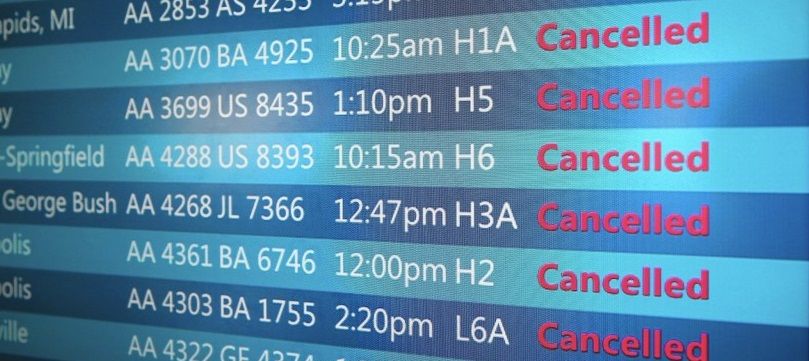With vaccination coverage reaching almost two-thirds of the global population and coronavirus cases significantly down from the peak at the beginning of 2022, business and leisure travel demand has resumed.
International travel from Europe was set to make a promising start to recovery in 2022. However, chaos at many European airports is likely to hinder growth as queues and cancellations are quickly becoming air travel norms.
The summer holiday season in the Northern Hemisphere has brought additional challenges for airlines and airports around the world, with thousands of cancelled and delayed flights due to extreme staffing shortages, labour actions, increased operational requirements, and fleet reductions during the pandemic. These factors have driven airlines around the world to cancel an unprecedented number of flights in recent months.
Hannah Free, Travel and Tourism Analyst at GlobalData, comments, “International departures from European countries are expected to reach 69% of 2019 figures in 2022, according to GlobalData forecasts. While destinations are eager to welcome visitors, supply simply cannot meet demand following extreme staffing deficits and industrial disputes, which has coincided with a rebound in international travel.”
As well as observed chaos and cancellations at several European airports, the travel industry’s recovery is also contending with other challenges including inflation, the rising cost of living, and the Russia-Ukraine conflict. All these challenges are likely to significantly dampen travel demand.
Free continues,“Airports like London Heathrow and Amsterdam’s Schiphol have been forced to ask airlines to cut flights, while many carriers have had to pre-emptively cull their schedules by the thousands, affecting millions of holidaymakers. easyJet has reportedly cut more than 11,000 flights from its summer schedule. Meanwhile, British Airways has now cancelled 13% of its summer schedule, following a statement on July 6, 2022, that the company is to axe another 10,300 short-haul flights up to the end of October 2022.”
Both easyJet and British Airways have cited staff shortages as the reason for culling flights. However, when looking at British Airways’ hiring trends, the airline may have failed to adequately prepare for a rebound in travel demand this summer. In November 2021, British Airways announced that it would be increasing its workforce by 15%, adding around 4,000 personnel including pilots, cabin crew, ground staff and back-office roles as part of a recruitment drive to prepare for COVID-19 recovery.
However, the recruitment drive has fallen short after British Airways reportedly cut as many as 10,000 jobs during the pandemic. Furthermore, according to hiring trends data on GlobalData’s Job Analytics Database, British Airways had not increased the number of job postings (active jobs) on its career pages until at least March 2022. GlobalData found that active job postings declined by 18.4% between November 2021 and February 2022.
Free adds, “While this example looks specifically at British Airways, it should be emphasized that this is an industry-wide issue with massive staff shortages, following cuts during the pandemic, causing major issues for several airlines. The interconnected nature of the tourism ecosystem – which sees hotels, airlines, car rental firms, tour operators, cruise lines and others dependent on each other along the traveller journey – means that disruption issues at any point along this chain has the potential to negatively affect the others. Unfortunately, prolonged financial hardship for a number of industry players is the corollary of cancelled flights.”
The situation in North America
Although passenger volumes are still below 2019 pre-pandemic levels, not only European travelers are facing massive flight cancellations and delays since May 2022. North American travelers are also having the same nightmare. For instance, Air Canada recently announced that it would cancel more than 9,500 flights over July and August, representing approximately 15% of its scheduled flights during the summer, one of the largest cancellation actions among global airlines this year.
Impact on Travel Insurance Business
The increase in flight cancellations and delays, as well as baggage losses, will make travel insurance unprofitable for most insurance carriers in 2022.
“With many airlines and airports around the world facing extremely high levels of flight cancellations and delays in recent months, we expect that the travel insurance industry will experience combined ratios over 100% due to the increase in insurance losses, making this business line unprofitable for most insurance companies in 2022,” said Marcos Alvarez, Senior Vice President and Global Head of Insurance.
Even if airlines manage to accommodate passengers with canceled flights at a different time or fully refund the ticket cost, travel insurance policies are likely to be triggered. In such cases, many policyholders will claim under their trip cancellation or trip interruption coverages any related nonrefundable travel costs such as connecting flights with a different airline, as well as prepaid hotels and car rentals. Flight and baggage delays will also trigger financial compensation under most travel insurance policies, further increasing travel insurance companies’ loss ratios, according to DBRS Morningstar.
“This will compound the problems experienced by the travel insurance business since the beginning of the pandemic, as insurance companies were initially hit by a jump in claims and then by the collapse of global travel, which considerably decreased the demand for this product.”
Impact of Travel Insurance Losses on Insurers’ Credit Profiles
Although it is anticipated that the travel insurance business will be unprofitable for most companies this year, losses should remain manageable given insurance companies’ high degree of diversification across different business lines. For most of the largest travel insurance providers, travel insurance typically accounts for less than 5% of their total gross premiums written. The relatively low contribution of travel insurance to overall revenues will help mitigate the impact on insurance groups’ credit profiles.
It is expected that travel insurance will become more expensive in the short term, given the mounting losses generated by numerous flight delays and cancellations. Some travel insurance companies could also stop providing trip interruption and cancellation coverages for some time, focusing more on the medical side of the business. However, we believe that such a strategy will be only a temporary restriction as airline and airport performance improves over the upcoming months. However, some insurance companies could exit or substantially decrease their exposure to the travel insurance business, given the volatility in profitability since the beginning of the pandemic. Moreover, a resurgence in coronavirus cases could force governments to reintroduce travel restrictions, which would negatively affect the demand for travel insurance.













